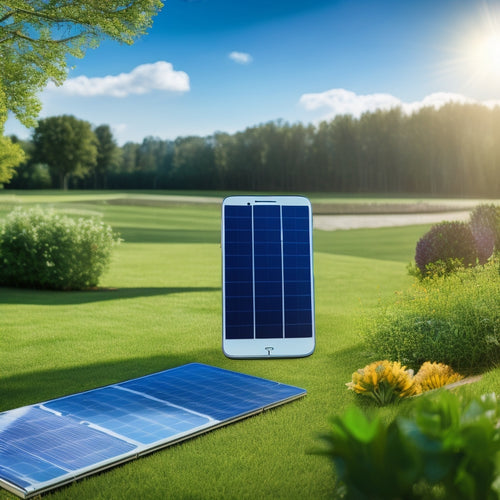
Top Kits for Vehicle Roofing Systems
Share
When selecting a top kit for your vehicle's roofing system, take into account factors like energy independence, durability, and seamless integration. Look for flexible or rigid solar panels that conform to curved surfaces, and choose a commercial vehicle solar kit that guarantees efficient energy harvesting and waterproofing. Top brands like Tesla, Rivian, and Ford offer innovative solutions. Make sure your chosen kit prioritizes high-quality solar panels, compatibility, and precise alignment for peak performance. As you weigh your options, consider the importance of warranty, durability, and energy efficiency. Now, explore the best solar panel roofing options that cater to your unique vehicle needs.
Key Takeaways
• Choose a solar kit with high-quality, durable panels that resist environmental stressors and ensure high energy conversion rates.
• Consider the roof size, electrical configuration, and mounting requirements to ensure seamless integration with unique roof requirements.
• Look for kits with certifications and compliance with industry standards, and a comprehensive warranty and support from the manufacturer.
• Select a kit that prioritizes energy efficiency, reliability, and safety, with a guarantee of smooth integration with the vehicle's roofing system.
• Opt for a kit with high-efficiency solar panels to enhance energy output while minimizing roof space, ideal for off-grid systems with energy storage needs.
Best Solar Panel Roofing Options
You'll find that the best solar panel roofing options for your vehicle typically fall into three categories: flexible panels, foldable panels, and rigid panels, each offering distinct benefits and drawbacks depending on your specific needs and preferences.
When considering roof integration, flexible panels are a popular choice as they conform to the curved surface of your vehicle's roof, providing a sleek and aerodynamic look. They're also lightweight and easy to install, making them a great option for those seeking a hassle-free setup.
On the other hand, foldable panels offer the convenience of portability and can be easily stowed away when not in use. Rigid panels, while more traditional, provide a high level of energy independence and can be mounted at an ideal angle for maximum energy harvesting.
When choosing the right option for your vehicle, consider factors such as energy requirements, roof space, and personal preferences. By selecting the right solar panel roofing option, you'll be one step closer to achieving energy independence and reducing your carbon footprint.
Commercial Vehicle Solar Kit Features
When outfitting your commercial vehicle with a solar roofing system, selecting a kit that meets your specific energy requirements is essential, and understanding the features that distinguish high-quality commercial vehicle solar kits is vital to achieving peak performance.
A premium commercial vehicle solar kit should integrate seamlessly with your vehicle's electrical system, ensuring safe and efficient energy harvesting. Key features to look for include:
| Feature | Description | Importance |
|---|---|---|
| Vehicle Integration | Ensures safe and efficient energy harvesting | High |
| Battery Capacity | Determines the amount of energy that can be stored | High |
| Waterproofing | Protects the system from environmental elements | Medium |
| Mounting Options | Allows for flexible installation on various vehicle types | Medium |
| Warranty | Provides protection against manufacturing defects | Low |
When choosing a commercial vehicle solar kit, prioritize features that align with your energy needs and vehicle type. By doing so, you'll secure a reliable and efficient solar roofing system that meets your specific requirements.
Top Brands for Solar Roofing Systems
When selecting a top brand for your solar roofing system, you'll want to prioritize companies that offer high-quality solar panels with efficient energy harvesting systems.
These systems should be built to last, using durable roofing materials that can withstand the elements and harsh conditions on the road.
Solar Panel Quality Matters
Choosing top-quality solar panels is vital to guaranteeing peak energy generation and prolonging the lifespan of your vehicle's roofing system. You want to make sure that your solar panels can withstand harsh weather conditions and last for a long time. That's why panel durability is important. Look for solar panels with a durable anodized aluminum frame that can resist corrosion and extreme temperatures. A sturdy panel will minimize the risk of damage and ensure consistent energy yields.
When it comes to energy yields, you want to maximize your energy generation. High-quality solar panels with high-efficiency cells can generate more power per hour of sunlight. Look for solar panels with a high power output warranty, usually 25 years or more, to guarantee consistent energy yields. Top brands like Panasonic, SunPower, and LG offer high-quality solar panels that meet these standards.
Efficient Energy Harvesting Systems
Equipping your vehicle's roofing system with an efficient energy harvesting system is essential to maximize your solar power generation, and top brands like Tesla, Rivian, and Ford offer innovative solutions that integrate seamlessly with their solar roofing systems.
As you explore the world of renewable trends, it's important to prioritize energy storage to guarantee a reliable and consistent power supply.
Here are some key considerations for efficient energy harvesting systems:
-
Optimized Energy Conversion: Look for systems that maximize energy conversion rates, ensuring you get the most out of your solar panels.
-
Advanced Energy Storage: Choose systems with advanced energy storage capabilities, allowing you to store excess energy for later use.
-
Seamless Integration: Ensure your energy harvesting system integrates seamlessly with your solar roofing system, eliminating energy losses and optimizing performance.
- Real-time Monitoring: Opt for systems with real-time monitoring capabilities, enabling you to track your energy generation and storage in real-time.
Durable Roofing Materials Used
You'll want to select roofing materials that can withstand the elements and support the weight of your solar panels, which is why top brands like Tesla, Rivian, and Ford opt for durable materials like tempered glass, anodized aluminum, and high-strength steel alloys in their solar roofing systems. These materials provide exceptional weather resistance, guaranteeing your solar panels remain secure and functional even in harsh environmental conditions.
To further enhance durability, top brands often apply waterproof coatings to their roofing materials. These coatings create an impermeable barrier that prevents water from penetrating the roof's surface, reducing the risk of water damage and electrical shorts. By combining durable materials with waterproof coatings, top brands can assure a reliable and safe solar roofing system.
When choosing a roofing material, consider the weight and size of your solar panels, as well as the environmental conditions your vehicle will be exposed to. By selecting materials that meet these requirements, you can establish a safe and efficient solar roofing system that provides reliable energy for your vehicle.
Key Considerations for Installation
When installing a vehicle roofing system, it's vital that all components are precisely aligned to guarantee a watertight seal and peak performance. You can't afford to overlook even the slightest misalignment, as it can lead to water intrusion, structural compromise, and safety risks.
To secure a successful installation, consider the following key factors:
-
Roof Inspections: Conduct thorough roof inspections to identify any damage, corrosion, or wear that may affect the new roofing system's performance.
-
Structural Assessments: Perform structural assessments to determine the vehicle's load-carrying capacity and make sure the roofing system is compatible with the vehicle's design.
-
Material Compatibility: Verify that all components, including adhesives, sealants, and coatings, are compatible to prevent material degradation or incompatibility issues.
- Environmental Factors: Account for environmental factors, such as temperature, humidity, and UV exposure, to guarantee the roofing system can withstand various climates and conditions.
Benefits of Solar Roofing Systems
Moreover, by integrating a solar roofing system, you can transform your vehicle's roof into a power-generating asset, reducing your reliance on traditional energy sources and tapping into a range of benefits.
One of the most significant advantages is the potential for cost savings. With a solar roofing system, you can generate your own electricity and reduce your energy bills. This can be particularly beneficial for campervans, motorhomes, and caravans, where energy consumption can be high.
Additionally, solar roofing systems have a positive environmental impact, reducing your carbon footprint and contributing to a cleaner, greener environment. By harnessing renewable energy, you'll not only reduce your energy costs but also minimize your impact on the environment.
Moreover, solar roofing systems are designed to be durable and long-lasting, ensuring a safe and reliable source of energy for years to come. By choosing a solar roofing system, you'll enjoy a range of benefits that extend far beyond cost savings and environmental benefits, enhancing your overall vehicle experience.
Choosing the Right Solar Kit
When selecting a solar kit for your vehicle's roofing system, you need to prioritize solar panel quality, as it directly impacts energy output and overall system performance.
It's also essential to confirm system compatibility, considering factors like roof size, electrical configuration, and mounting requirements.
Solar Panel Quality Matters
You'll significantly impact the performance and longevity of your vehicle's roofing system by selecting a high-quality solar kit that integrates seamlessly with your roof's unique requirements. A high-quality solar kit guarantees excellent energy efficiency, reliability, and safety.
When choosing a solar kit, consider the following key factors:
-
Panel Reliability: Look for solar panels with a proven track record of durability and resistance to environmental stressors, such as extreme temperatures, humidity, and UV exposure.
-
Energy Efficiency: Opt for solar panels with high energy conversion rates to maximize your vehicle's energy output.
-
Certifications and Compliance: Ensure the solar kit meets industry standards and regulatory requirements, such as UL (Underwriters Laboratories) certification, to ensure a safe and reliable installation.
- Warranty and Support: Choose a reputable manufacturer that offers a thorough warranty and dedicated customer support to minimize downtime and ensure prompt issue resolution.
System Compatibility Is Key
Selecting a solar kit that seamlessly integrates with your vehicle's roofing system is crucial, as incompatibility can lead to reduced energy output, compromised safety, and shortened system lifespan. When choosing a kit, consider the specific requirements of your vehicle's roofing system to guarantee a smooth integration.
Roof Integration Compatibility Chart
| Vehicle Roof Type | Compatible Solar Kit Features |
|---|---|
| Fiberglass | Waterproof sealant, reinforced mounting points |
| Metal | Electromagnetic interference (EMI) shielding, corrosion-resistant hardware |
| Fabric | Reinforced stitching, waterproof coating |
| Composite | Lightweight, high-strength materials, advanced adhesive bonding |
| Custom | Consult with manufacturer for bespoke solutions |
High-Efficiency Solar Panel Systems
By incorporating high-efficiency solar panels into your vehicle roofing system, you can greatly enhance your energy output while minimizing roof space. This is particularly advantageous for off-grid systems, where energy storage is important. With high-efficiency solar panels, you can generate more power in a smaller area, allowing you to stay off-grid for longer periods.
Here are some key benefits of high-efficiency solar panels:
- Higher energy output per unit area, allowing for more efficient energy harvesting
- Improved durability and resistance to environmental stressors, ensuring reliable performance
- Enhanced compatibility with energy storage systems, enabling seamless integration
- Increased flexibility in system design, allowing for tailored solutions to meet your specific needs
Frequently Asked Questions
Can Solar Panel Roofing Systems Be Installed on Old Vehicles?
'Like a phoenix rising from the ashes, you can revive your old vehicle with a solar panel roofing system retrofit, but it's vital to guarantee a safe, precise vintage conversion, consulting experts to avoid electrical and structural risks.'
Do Solar Roofing Systems Void a Vehicle's Warranty?
When installing a solar roofing system, you should verify if it'll void your vehicle's warranty; without manufacturer authorization, it might, so make sure you obtain approval to avoid warranty implications and maintain your vehicle's safety and reliability.
How Long Do Solar Panels on Vehicles Typically Last?
You can expect solar panels on vehicles to last around 20-30 years, with a gradual panel degradation of 0.5-1% per year, resulting in a slight decrease in energy output over time, ensuring a safe and reliable power source.
Are Solar Roofing Systems Compatible With All Vehicle Types?
You'll find that solar roofing systems aren't compatible with all vehicle types, as they require specific vehicle dimensions and material options to guarantee a safe, secure fit and best energy harnessing.
Can I Install a Solar Roofing System Myself?
When considering a DIY solar roofing system installation, you'll face DIY challenges, such as ensuring a watertight seal and proper electrical connections; it's important to seek expert guidance to avoid safety risks and ensure a successful, efficient installation.
Related Posts
-

3 Ways Wind Power Boosts Home Value
Living near a wind farm can enhance your property's value in three significant ways. To begin with, proximity to wind...
-

7 Best Solar Panel Upkeep Apps for Homeowners
You can optimize your solar panel's energy output and efficiency by up to 20% with regular maintenance, which is wher...
-

Why Grow Up? Vertical Gardens Transform Urban Living
As you change your urban living space, you're not just growing up - you're bringing nature back into the heart of the...


